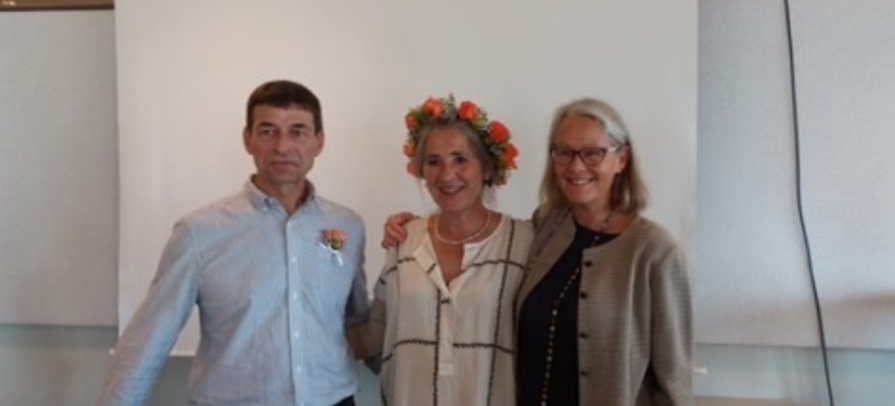Ása Róin vart ph.d. við Linköpings Universitet
Í dag 4. september hevur Ása Róin vart ph.d.ritgerð sína við Linköpings Universitet. Ritgerðin kallast: “On the making of age. A constructionist study on ageing and later life in the Faroe Islands.”
Verjan fór fram í Campus Norrköping, men var víst á stórskýggja.
Boðið var vælkomin og greitt var frá mannagongdini.
Christopher Phillipson, professari á Mancherster Universiteti og formaður í metingarnevndini legði fyri við uppleggi. Síðani var framhaldandi orðaskifti út frá ritgerðini. Síðani høvdu limirnir í metingarnevndini høvi at seta spurningar.
Tá ið verjan var liðug fór metingarnevndin á fund at taka støðu til hvørt ph.d. heitið kundi latast. Formaðurin kunnaði um, at nevndin var samd um, at ph.d. heitið skuldi latast.
Ása Róin starvast á Sjúkrarøktarfrøðideildini á Fróðskaparsetri Føroya og hevur verið innskrivað til ph.d. lestur á Institutionen för samhälls- och välfärdsstudier á Linköpings Universitet. Verkætlanin er lutvíst fíggjað úr Granskingargrunninum
Catharina Nord, lektari og Elisabet Cedersund, professar, báðar á Linköpings Universitet, hava verið vegleiðarar.
Opponentarnir vóru:
Christopher Phillipson, professari á Manchester University (UK),
Pirjo Nikander, professari á Tampere University (Finland) og
Håkan Jönsson, professari á Lunds Universitet.
Les um verkætlanina í Stuðulsyvirlitinum
Abstract
The aim of this thesis is to explore how older people living in the Faroe Islands make sense of ageing, how political intentions and strategies resonate with the lived reality of ageing and how theories on ageing compare with this reality.
This thesis builds on two data sets. The first set is derived from interviews with women aged 60 to 65 years old who suffer from long-term urine incontinence, a disorder commonly associated with old age. The second set is derived from group and individual interviews with community-dwelling men and women aged 68 to 91 years old.
The results are presented in four papers, each of which addresses aspects of ageing. Health, which appeared to be a strong determinant for how old age was constructed and negotiated, was one aspect considered. The meaning of home or one’s affiliation to a place of living was another important aspect studied. The results of that study indicated the necessity of understanding home as a multifaceted notion that goes beyond a house of residence. In particular, for participants living in small island villages, the notion of home was found to embrace a whole community or island rather than a house of residence, which should promote new thinking about services in remote regions.
The results compare with gerontological theories on ageing. However, the findings demonstrate the importance of acknowledging that the concepts of ageing and old age do not carry any predefined meanings but should be understood as contingent on social, cultural, historical and geographical conditions.
Keywords: meaning of ageing, older people, constructionism, Faroe Islands
